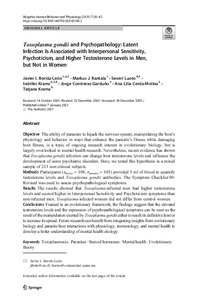Toxoplasma gondii and Psychopathology: Latent Infection Is Associated with Interpersonal Sensitivity, Psychoticism, and Higher Testosterone Levels in Men, but Not in Women
Borráz-León Javier I; Rantala Markus J; Luoto Severi; Krams Indrikis; Contreras-Garduno Jorge; Cerda-Molina Ana Lilia; Krama Tatjana
Toxoplasma gondii and Psychopathology: Latent Infection Is Associated with Interpersonal Sensitivity, Psychoticism, and Higher Testosterone Levels in Men, but Not in Women
Borráz-León Javier I
Rantala Markus J
Luoto Severi
Krams Indrikis
Contreras-Garduno Jorge
Cerda-Molina Ana Lilia
Krama Tatjana
SPRINGER HEIDELBERG
Julkaisun pysyvä osoite on:
https://urn.fi/URN:NBN:fi-fe2021042820878
https://urn.fi/URN:NBN:fi-fe2021042820878
Tiivistelmä
Objective
The ability of parasites to hijack the nervous system, manipulating the host's physiology and behavior in ways that enhance the parasite's fitness while damaging host fitness, is a topic of ongoing research interest in evolutionary biology, but is largely overlooked in mental health research. Nevertheless, recent evidence has shown that Toxoplasma gondii infection can change host testosterone levels and influence the development of some psychiatric disorders. Here, we tested this hypothesis in a mixed sample of 213 non-clinical subjects.
Methods
Participants (n(males) = 108, n(females) = 105) provided 5 ml of blood to quantify testosterone levels and Toxoplasma gondii antibodies. The Symptom Checklist-90-Revised was used to assess psychopathological symptoms.
Results
The results showed that Toxoplasma-infected men had higher testosterone levels and scored higher in Interpersonal Sensitivity and Psychoticism symptoms than non-infected men. Toxoplasma-infected women did not differ from control women.
Conclusions
Framed in an evolutionary framework, the findings suggest that the elevated testosterone levels and the expression of psychopathological symptoms can be seen as the result of the manipulation exerted by Toxoplasma gondii either to reach its definitive host or to increase its spread. Future research can benefit from integrating insights from evolutionary biology and parasite-host interactions with physiology, immunology, and mental health to develop a better understanding of mental health etiology.
Kokoelmat
- Rinnakkaistallenteet [27094]
